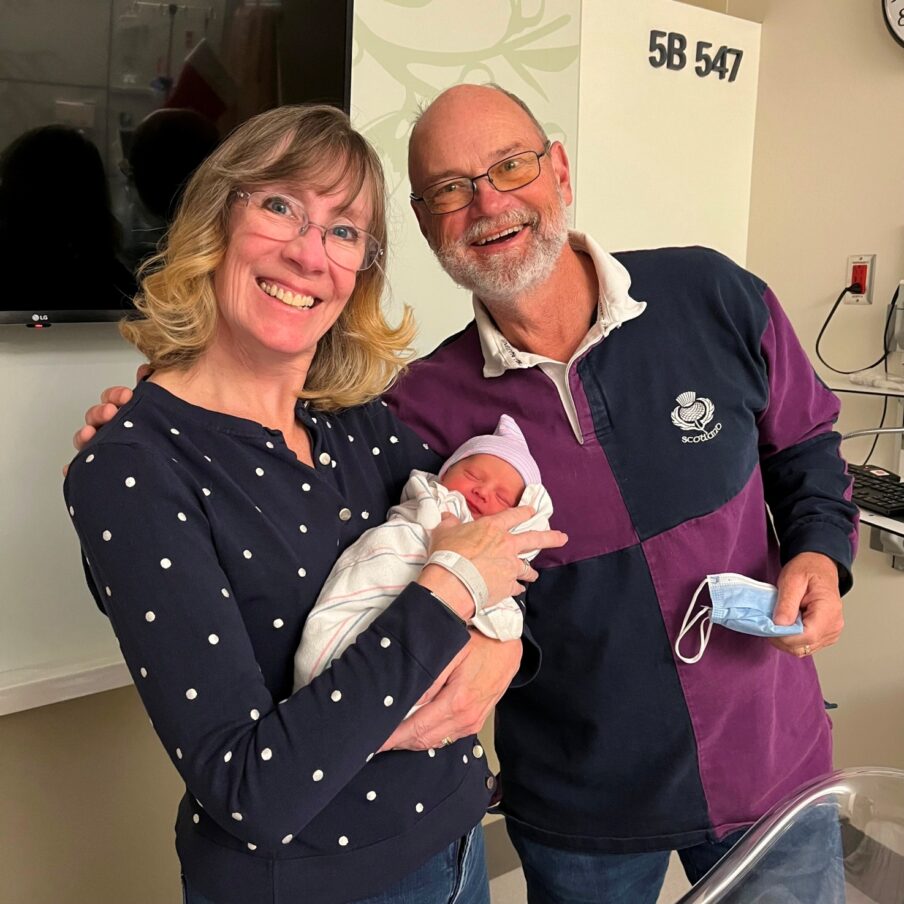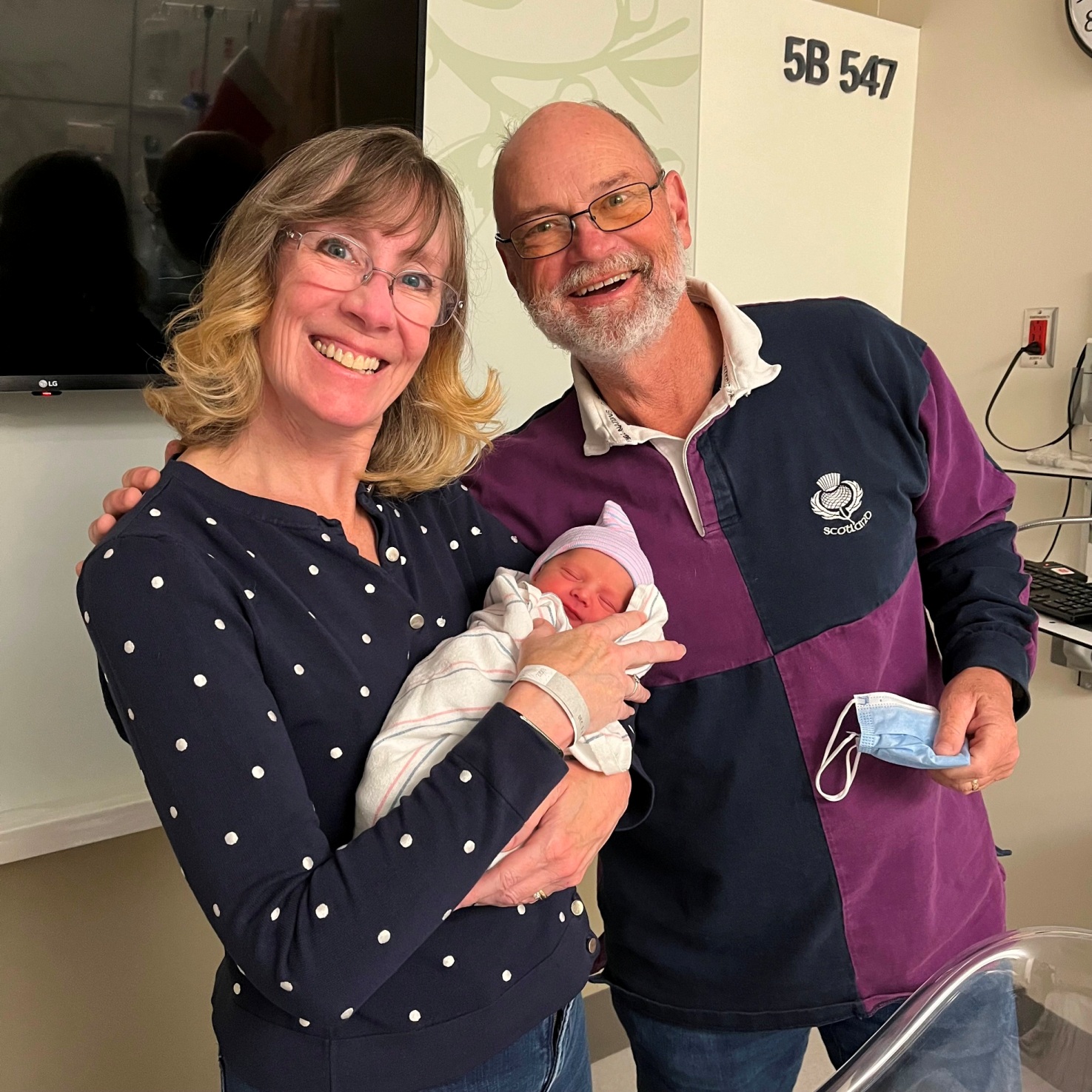Sarah Sundin, @sarahsundin
In December, our first grandson was born. Recently we watched him for a day so my son and daughter-in-law could attend a wedding. Afterward, I told my friends, “Taking care of a newborn is so much easier when you’ve had a full night’s sleep!”
Because I’m a novelist, I look for connections. This conversation got me thinking about the similarities between grandparenting and novel writing.
Distance
As a grandma, I don’t do the late-night feedings. I get regular showers. I can eat a hot meal uninterrupted. But my son and my daughter-in-law are in the thick of it.
There’s an element of distance to the grandparenting relationship in that I don’t directly experience the ups and downs of parenting, the difficulties and the challenges. I watch my son and daughter-in-law in action. I listen to them. I help them whenever I can. But at the end of the day, I go home to a quiet house and a good night’s sleep.
That distance also lets me actually enjoy diaper changing—I snatch that boy out of his mama’s hands when he needs a change!
As authors, we have a similar relationship with our characters. We don’t directly experience the events of our stories, for which I am very grateful.
My characters deal with danger and heartbreak and storms and bad guys with guns. I do walk through these intense moments with my characters. I listen to them. And yes, I help them find their way out of that fix. But I can take a break whenever I want, grab a cup of tea, take a walk, and come back to the drama refreshed.
The distance we have as authors also allows us to get excited over things we’d hate in real life. Ever get a sense of glee when you send your heroine running for her life? You know exactly what I’m talking about.
Everything he does is cute
My daughter-in-law sends me mini-videos of my grandson sucking his pacifier or flailing his little arms. And I watch them over and over and over and…
When we’re together, I just stare into those beautiful eyes. I can’t get enough.
And when we’re apart, I long for the next time I’ll see him.
Yep. I’ve got it bad.

But haven’t we all been there with our stories? That giddiness when the scene is flowing or a new idea pops into your mind that explains why your heroine is the way she is? That longing to get back to writing when life interrupts and makes you do life?
Our stories are utterly adorable. Pinch those cheeks and savor every moment.
Perspective
When you’re a new parent, it feels like the sleepless nights and the crying fits will never end.
As a grandma, I remember those days well—and I’m thoroughly enjoying the memories of my son’s baby years that are arising now that he’s a daddy.
Because decades have passed since I was a new mom, I can look at the baby years with perspective. I know raising a baby is the hardest work you’ll ever do, but it doesn’t last forever. I know being a parent makes you grow and change. And I know the end result is worth every diaper, every tantrum, and every snarky teenage eye roll.
As authors, we have perspectives our characters lack. We know what they’re going through is hard, but it won’t last forever. We know the pain they’re experiencing—all right, the pain we’ve inflicted on them—will cause them to grow and change and be better people than they were before. And we know a happy ending awaits them.
Relate in Compassion
So what does a grandma do with distance, perspective, and overflowing love? I’ve chosen to relate to the new parents with compassion. When my daughter was pitching a fit in the grocery, I hated when sweet little old ladies told me how precious those days were. No, they weren’t. I wanted them to be over. I will not say similar things to my son and daughter-in-law.
Rather, I commiserate. I share memories—the good and the bad. I tell them I remember how hard it was and how frustrating it was, along with overwhelmingly joyful and delightful it was. And I tell them what a great job they’re doing.
As authors, we don’t experience the story events directly—but our novels will be richest when we remember deeply. We’ve all experienced terror and rejection and joy and grief. Dredge up those emotions and feel them alongside your characters.
Relate to your characters with compassion for the misery they’re experiencing. Use the misery for a good purpose, to mold your hero or heroine into a better person. And give them the happy ending they long for.
When the Germans march into Denmark, Baron Henrik Ahlefeldt exchanges his nobility for anonymity, assuming a new identity so he can secretly row messages for the Danish Resistance across the waters to Sweden. American physicist Dr. Else Jensen refuses to leave Copenhagen and abandon her research—her life’s dream—and makes a dangerous decision to print resistance newspapers.
As Else hears rumors of the movement’s legendary Havmand—the merman—she also becomes intrigued by the mysterious and silent shipyard worker living in the same boardinghouse. Henrik makes every effort to conceal his noble upbringing, but he is torn between the façade he must maintain and the woman he is beginning to fall in love with.
When the Occupation cracks down on the Danes, these two passionate people will discover if there is more power in speech . . . or in silence.
Sarah Sundin is an ECPA- and CBA-bestselling author of World War II novels, including The Sound of Light (Revell, February 2023). Her novel Until Leaves Fall in Paris won the 2022 Christy Award, When Twilight Breaks, and The Land Beneath Us were Christy Award finalists, and The Sky Above Us won the 2020 Carol Award. A mother of three adult children, Sarah lives in Southern California and enjoys speaking for church, community, and writers’ groups. She serves as Co-Director for the West Coast Christian Writers Conference. You can find her at http://www.sarahsundin.com




Comments 4
What a unique perspective on writing novels! Thank you, Sarah. I enjoyed your post.
Blessings,
MaryAnn
Thank you, MaryAnn!
What an apt comparison! Loved every word.
That was excellent insight, Sarah. Thank you for sharing!